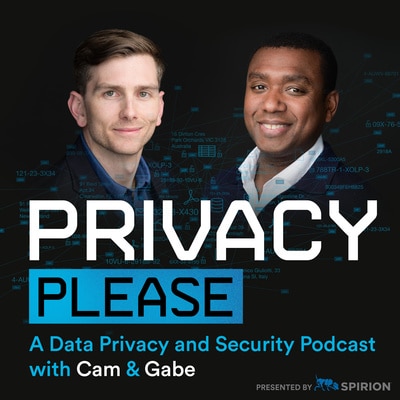Sergeant First Class (SFC) Brittany Conley, Senior Recruiter, Team Lead for the South Carolina National Guard, shares her experience with privacy after a viral LinkedIn post
Most of the guests on our “Privacy Please” podcast work in the data and privacy industry and share their perspective of protecting people’s data. But this week, we talk to Sergeant First Class (SFC) Brittany Conley, Senior Recruiter, Team Lead for the South Carolina National Guard, who shares both sides of the issue – her concern about her own privacy after a viral LinkedIn post, and her role in the military protecting privacy. Her post, shown below, went viral with 241,000+ reactions and over 12,000 comments. We cover a lot of ground this week, including why she posted, how the military protects privacy, and the age-old debate about whether or not cats have regrets.
Here are three highlights from our chat:
Privacy Concerns with Her Viral LinkedIn Post
When Conley uploaded her now-famous LinkedIn post, she had no idea it would get any attention beyond her immediate connections; she just wanted to share her story. When she wrote the post, she was excited about her recent graduation and wanted to share how grateful she was with her success when it could have easily gone up in flames. As a recruiter for the National Guard, she also wanted to highlight for people who were seeking to improve themselves that they had options – both education and the National Guard. She sees firsthand how the National Guard helps its soldiers with personal challenges because the organization knows that if their soldiers are worried about employment, where to live, or their next meal, then they are not going to be able to serve the organization.
She was shocked when she logged in to LinkedIn a few days later and saw how much the post had resonated with people. And even though she knew the benefits of sharing, Conley was concerned about her privacy when she posted her story. She proactively let her family know when the post went viral, and she even de-activated her Instagram and Facebook accounts for a short time. Because both of those platforms lend more toward personal relationships, she was hoping to keep her post only on LinkedIn, which it has up to this point. She also points out that some employers might have an issue with an employee sharing such a personal story, but that the National Guard was very supportive of her post, even after all the attention it garnered.
Telling your story
“We’re constantly hiding behind what could be perceived as a really negative past. I don’t think your past truly defines you as a person because we can all develop and change for the better of our community. If we don’t tell those stories, how do we really improve as people, and a community and country? If we’re not talking about the things that we went through to get to where we’re at today?”
-Brittany Conley, Senior Recruiter, Team Lead for the South Carolina National Guard
How the Military Keeps Critical Information Private
Conley shares with us that the military deals with two very different types of sensitive information: soldiers’ personal information and mission data. For personal information such as social security cards and birth certificates, she shreds all the copies she makes after uploading the documents into the appropriate computer systems. Since personal data is sometimes shared through email, Conley explains that all emails are encrypted. For mission details (where they are going, how many soldiers, the goal of the mission, etc.), they go low tech and share it only with people who need to know — by word of mouth. She explains that the military doesn’t want soldiers to post on Facebook that they are going on a three-day mission, or for a family to learn that their loved one died through another soldier’s social media post.
Sharing mission-critical information
“In the military, we have to restrict information to the lowest level just to protect people’s information and the mission. It really becomes a security thing, such as National Guard units going to a location for riot duty. We don’t need to be spreading that information because it puts their lives at risk, even during missions in the States. We’ve got to make sure that our soldiers are safe and our service members are safe when they’re completing missions.”
-Brittany Conley, Senior Recruiter, Team Lead for the South Carolina National Guard
Sharing Our Stories about Our Past Helps Both Others and Ourselves
Conley spoke in-depth during our conversation about how she strongly feels that people need to communicate with each other about their hardships to help others along that path. If she hadn’t been open about her struggles with her friends many years ago, then the friend who helped her find the National Guard wouldn’t have known she needed help. She points out that everyone has dealt with significant issues in their lives, even when it doesn’t appear that way from their social media posts. She points to her own LinkedIn picture and professional profile, which without her post doesn’t hint to a challenging past. While she admits that it can feel uncomfortable to share your story, and privacy online is an issue to consider, she also points out that if people are going to judge you negatively because of your past, you should ask yourself why you are even talking to them in the first place.
You may be wondering how Conley balances her personal and professional life on her social media posts, which is something most of us think about. During our conversation, she goes into great detail about her perspective and how she manages her hobby as a bodybuilder with her professional profile for the military. But we purposely left it out of the recap, so you need to listen to the episode to get tips on how to manage this balance in your own life. And as an added bonus, you will find out the most common misconception about the military. Listen to our conversation here.
Sharing mission-critical information
“Over the past week and a half, I’ve thought a lot about how people would perceive me, and me being a professional as a recruiter in the military versus a professional in the fitness world because sometimes they don’t always align. I had done a lot of soul searching and asked myself “Do I really want to keep my Instagram? Should I just delete it instead of just deactivating it? Is this something that I really want to do in the future?”
-Brittany Conley, Senior Recruiter, Team Lead for the South Carolina National Guard



